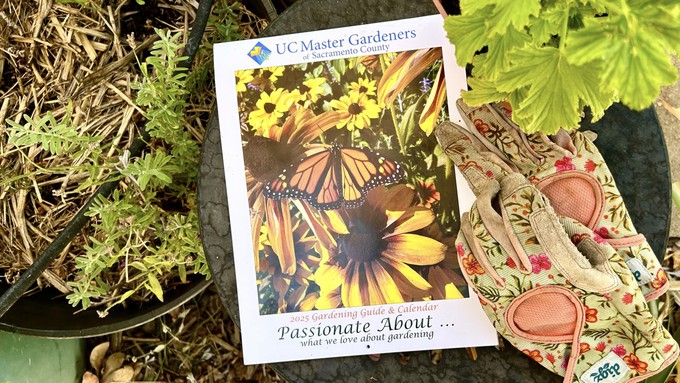
This info-packed calendar is like having a master gardener in your back pocket

"Passionate About ..." is the theme for the 2025 Sacramento County Gardening Guide & Calendar, now on sale. Kathy Morrison
What are your garden passions? Do you particularly love tending succulents? Growing fragrant plants? How about showing children the wonders of vegetable gardening?
Every gardener has a favorite aspect of gardening, something they particularly dig into. That idea is behind the theme of the Sacramento County master gardeners' 2025 Gardening Guide & Calendar: "Passionate About ... what we love about gardening."
The Gardening Guide & Calendar is an annual publication of the master gardeners, and it debuted for sale at Harvest Day earlier this month. It will be sold at all Sacramento master gardener events through the remainder of 2024, and into the new year. By September it should be available at several local nurseries, too. The price is $12 including tax if purchased from the master gardeners; cost at retailers may be slightly higher.
It also may be ordered online here. And do note: It makes a great gift.
As with every year, the 2025 version is packed with monthly tips and reminders, as well as stories and pictures related to the theme. The publication is written by local master gardeners, including me, and most of the photographs are from the group, too. Editor Laura Cerles-Rogers pulled together and organized the many pieces of this information-packed guide.
The pages for August, for example, feature a restful photo of a shade garden by master gardener Gail Pothour. Below the picture are columns of advice on August chores such as pinching back basil flowers to keep the plant producing fresh leaves. There are tips on fruit trees, ornamental plants, irrigation, and potential pests, all tied to the Sacramento region and climate.
At the bottom of the calendar page is one of my favorite features this year: Quotes from various (unnamed) master gardeners about their gardening passions and fascinations. (Mine's the second one on the July page, if you're curious.)
The back pages of the calendar feature larger articles on topics such as herbs, wildflower meadows and container gardening. This last article is especially useful for anyone with a only tiny place to garden -- or someone who has filled up their available space!
The final inside page includes an ultra-useful chart, "A Seasonal Guide to Vegetable Planting." Let's see: Latter half of August, a good time to get the chard, kale, leeks and turnip seeds planted.
For more information on the 2025 Gardening Guide & Calendar, go to https://sacmg.ucanr.edu/Gardening_Guide/
Comments
0 comments have been posted.Sacramento Digs Gardening to your inbox.
Food in My Back Yard Series
May 6: Maintain soil moisture with mulch for garden success
April 29: What's (already) wrong with my tomato plants?
April 22: Should you stock up on fertilizer? (Yes!)
April 15: Grow culinary herbs in containers
April 8: When to plant summer vegetables
April 1: Don't be fooled by these garden myths
March 25: Fertilizer tips: How to 'feed' your vegetables for healthy growth
March 18: Time to give vegetable seedlings some more space
March 11: Ways to win the fight against weeds
March 4: Potatoes from the garden
Feb. 25: Plant a fruit tree now -- for later
Feb. 18: How to squeeze more food into less space
Feb. 11: When to plant? Consider staggering your transplants
Feb. 4: Starting in seed starting
Sites We Like
Garden Checklist for week of May 11
Make the most of the lower temperatures early in the week. We’ll be back in the 80s by Thursday.
* Plant, plant, plant! It’s prime planting season in the Sacramento area. Time to set out those tomato transplants along with peppers and eggplants. Pinch off any flowers on new transplants to make them concentrate on establishing roots instead of setting premature fruit.
* Direct-seed melons, cucumbers, summer squash, corn, radishes, pumpkins and annual herbs such as basil.
* Harvest cabbage, lettuce, peas and green onions.
* In the flower garden, direct-seed sunflowers, cosmos, salvia, zinnias, marigolds, celosia and asters. (You also can transplant seedlings for many of the same flowers.)
* Plant dahlia tubers.
* Transplant petunias, marigolds and perennial flowers such as astilbe, columbine, coneflowers, coreopsis, dahlias, rudbeckia and verbena.
* Keep an eye out for slugs, snails, earwigs and aphids that want to dine on tender new growth.
* Feed summer bloomers with a balanced fertilizer.
* For continued bloom, cut off spent flowers on roses as well as other flowering plants.
* Add mulch to the garden to maintain moisture. Mulch also cuts down on weeds. But don’t let it mound around the stems or trunks of trees or shrubs. Leave about a 6-inch-to-1-foot circle to avoid crown rot or other problems.
* Remember to weed! Pull those nasties before they set seed.
* Water early in the day and keep seedlings evenly moist.